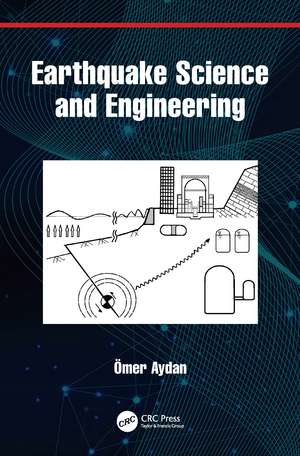Earthquake Science and Engineering
Autor Ömer Aydanen Limba Engleză Paperback – 26 aug 2024
Because this work covers both scientific and engineering aspects in a unified way, it offers a complete overview of earthquakes, their mechanics, their effects on (infra)structures and secondary associated events. As such, this book is aimed at engineering professionals with an earth sciences background (geology, seismology, geophysics) or those with an engineering background (civil, architecture, mining, geological engineering) or with both, and it can also serve as a reference work for academics and (under)graduate students.
| Toate formatele și edițiile | Preț | Express |
|---|---|---|
| Paperback (1) | 459.36 lei 43-57 zile | |
| CRC Press – 26 aug 2024 | 459.36 lei 43-57 zile | |
| Hardback (1) | 1183.40 lei 43-57 zile | |
| CRC Press – 18 iul 2022 | 1183.40 lei 43-57 zile |
Preț: 459.36 lei
Nou
Puncte Express: 689
Preț estimativ în valută:
87.91€ • 91.44$ • 72.57£
87.91€ • 91.44$ • 72.57£
Carte tipărită la comandă
Livrare economică 14-28 aprilie
Preluare comenzi: 021 569.72.76
Specificații
ISBN-13: 9780367758783
ISBN-10: 0367758784
Pagini: 518
Ilustrații: 1030
Dimensiuni: 174 x 246 mm
Greutate: 0.84 kg
Ediția:1
Editura: CRC Press
Colecția CRC Press
Locul publicării:Boca Raton, United States
ISBN-10: 0367758784
Pagini: 518
Ilustrații: 1030
Dimensiuni: 174 x 246 mm
Greutate: 0.84 kg
Ediția:1
Editura: CRC Press
Colecția CRC Press
Locul publicării:Boca Raton, United States
Public țintă
Academic, Adult education, Postgraduate, Professional, Professional Practice & Development, Undergraduate Advanced, and Undergraduate CoreCuprins
1. Introduction. 2. Physics of earthquakes. 3. Waves and theory of wave propagation. 4. Faults and faulting mechanism of earthquakes. 5. Strong ground motions and permanent ground deformations. 6. Vibration analyses of structures. 7. Effects of earthquakes associated surface ruptures on engineering structures. 8. Seismic design of structures. 9. Tsunami: its effects on structures, and the fundamentals of tsunami-proof design. 10. Earthquake prediction
Notă biografică
Ömer Aydan was born in 1955 and studied Mining Engineering at the Technical University of Istanbul, Turkey (B.Sc., 1979), Rock Mechanics and Excavation Engineering at the University of Newcastle upon Tyne, UK (M.Sc., 1982), and received his Ph.D. in Geotechnical Engineering from Nagoya University, Japan in 1989. Prof. Aydan worked at Nagoya University as a research associate (1987–1991), and then in the Department of Marine Civil Engineering at Tokai University, first as Assistant Professor (1991–1993), then as Associate Professor (1993–2001), and finally as Professor (2001–2010). He then became Professor of the Institute of Oceanic Research and Development at Tokai University, and is currently Professor at the University of the Ryukyus, Department of Civil Engineering & Architecture, Nishihara, Okinawa, Japan. He is also the director of the Disaster Prevention Research Center for Island Region of the University of the Ryukyus. Prof. Aydan has played an active role in numerous organizations such as ISRM, JSCE, JGS, SRI and Rock Mechanics and other National Group of Japan committees, and has organized several national and international symposia and conferences.
Descriere
This book addresses scientific and engineering aspects of earthquakes, which are generally taught and published on separately. This book intends to fill the gap between these two fields associated with earthquakes and help seismologists and earthquake engineers better communicate with and understand each other.
